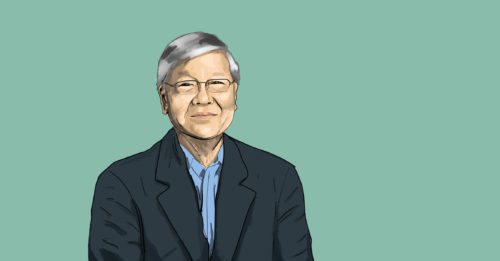Kou Aizhe, China’s collector of stories, is building a podcast empire
For five years, the StoryFM chief has helped air the personal narratives of hundreds of Chinese people from all segments of society. He's now ready to turn his podcast into a media empire.

January 25th, 2012. Baby can only survive with an overhead breathing aid. Through the glass, we look at our Jingjing in her slumber. She looks just like Snow White, lying there, poisoned by the witch’s apple — pink, tender, and unreachable. The doctor asked us to move her into the ICU, but I vehemently opposed it. If I can’t save her life, my imperative is that she is not alone. I can’t let her think mom and dad have left her.
This was the transcript from episode 13 of the hit podcast StoryFM (故事FM gùshì), a diary clip read by its writer, Anyue, a Shanghai civil servant, while sobbing uncontrollably.
Baby Jingjing passed away the next day in her mother’s embrace. As Anyue recalled, in the final moments singing her daughter away, “There were no tears. None left to be shed.”
I cried for a full minute in my living room over a plate of half-finished breakfast.
Meeting Kòu Àizhé 寇爱哲, the creator of StoryFM, in his studio on a Wednesday night, I tell him about this. He doesn’t look surprised. After all, he himself was overcome during the editing process, and this was before he became a dad. “An NPR friend of mine hit play on the story while driving,” he says. “Obviously, he had to park the car for a while to recover.”
In other words, his friend had a “driveway moment.” The phrase takes from the world of American public radio, and refers to an audio segment so compelling that people will leave their cars running in the driveway to finish listening to it. Anyue’s loss was devastating. Kou’s presentation was flawless. Together, they achieved the holy grail of storytelling.

StoryFM faithfully documents the ordinary and extraordinary stories of Chinese people, from grinding at a dirty dance club in Chengdu to surviving a dark Syrian dungeon run by its intelligence service. When he launched his first-person narrative podcast five years ago, Kou Aizhe did not know it would become a chart-topping sensation. For four years running, it has been selected as one of the best podcasts by Apple China, and has grabbed the attention of international publications like the Economist and Japan’s NHK.
Kou’s team currently publishes three episodes a week, with 1.5 million downloads per episode. The founder is confident they will continue to set the benchmark for narrative podcasting in China — not only for production value, but for how the production business is run.
As an exclusive reveal, Kou tells me a spin-off music label of StoryFM is on the horizon, thanks to their sizable portfolio of original compositions. Additionally, discussions on several pod-to-film projects are reaching their final stages. The podcasting house is also set to release several new shows in the next months, its first steps toward building a media network.
Kou, a relative greenhorn when it comes to starting businesses, is entering a year of tremendous growth as a boss. But his heart is still in the simple act of storytelling. “Once a COO-esque person emerges — in-house or by recruit — I’ll again return to content,” he says. “It’s a genuine wish of mine, but I can’t make any promises now.”
The hit maker
StoryFM has 2 million subscribers across platforms, with many of them submitting story leads. Presently, more than 70% of StoryFM’s published stories are from listener tips. But most submissions don’t make the cut. What Kou and his producers look for every Monday morning falls into one of two categories: either novelty or empathy. (Or both, on particularly good days.) Experiences that either very few people or very many can relate to. “The one quality we look for (in interviewees) is an ability to introspect,” says Yebu, a third-year producer. It’s not, as people would expect, a person’s eloquence or personality.
The making of an episode usually begins with a two-hour interview between the storyteller and Kou (or one of his producers), recorded in a soundproof room. (My interview with Kou is in this room. It’s so well padded that I’m tricked into thinking my voice has changed — the foam eliminates any trace of reverb.) After sitting the subject down next to a tiny wooden desk, Kou hops on a stool at a 45-degree angle, leaving no physical barrier between them. When the recording light is on, Kou often leans close to the interviewee. Atop the desk lies a bag of tissues for wiping away tears.

In a 2019 interview with Vistopia, StoryFM co-founder and head of content Péng Hán 彭寒 compared their show to the art genre Ukiyo-e of Japan’s Edo Period, or The Plum in the Golden Vase, the (in)famous vernacular novel of the Ming Dynasty. Both art forms are celebrated for their truthful yet inventive documentation of their time.
Literature and painting count as visual storytelling. “Audio storytelling, on the other hand, is extremely linear, and its audience doesn’t have much patience,” Kou says. But he believes “it’s the medium that best builds empathy and mutual understanding.”
Wǒbùpǎodiào 我不跑调, an industry observer who has clocked in some 2,000 hours of podcast listening time, agrees. As the writer for Podcast Peas, an independent blog featuring a series of interviews with creative podcasters, she concludes that the three pillars of StoryFM’s first-person narrative format are “deep immersion, authenticity, and trustworthiness.” The unavoidable downside, adds the blogger, is that the singular point of view of the narrator can sometimes appear limiting.
For the show’s most rapacious listeners, the limitations of perspective are no detriment. To them, Aizhe & Co’s creation is comfort food — though many, Kou says, offer feedback that the stories “are too depressing, sad, or even sleep-ruining.” He counters by highlighting a recent remark about them on Weibo, which read, “To cure and to depress are two sides of the same coin.” Feeling a need to elaborate, he adds, “It’s like how we’d watch thrillers to better appreciate safety. We empathize with the unfortunate stories to better cherish what we have. Our stories are actionable, in that they motivate our listeners to make a go for happiness.”
The StoryFM team gravitates toward people who live outside of mainstream news coverage. It has given voice to the supporting wives of long-haul truck drivers, the mother of a transgendered teenager, and an autistic man who desires genuine friendship, to name just a few. “We really took time to understand what’s changing in modern China, and where we’re heading towards,” says Yebu, whose story centering on a twentysomething COVID patient’s quest to care for her grandmother at Wuhan’s Huoshenshan Hospital garnered the attention of China’s state broadcaster, CCTV. The audience, which is fine-tuned to China’s changes, includes a demographic much more diverse than typical Chinese podcast listeners, who are generally young, college-educated office workers in big cities.
“My mother listens to StoryFM,” Shi Hualun, a 26-year-old podcast producer at the Shanghai-based production company JustPod, tells me. “Its most recent episode was a story of a middle-aged gay man who’s only attracted to the elderly. The show paints a richly diverse China for those who aren’t necessarily in the most progressive age group.”
Hailed by the New York Times as “giving voice to the real,” StoryFM’s influence has spilled over the border. Among China observers, the show offers endless vantage points into a country they spend their daytime researching. Jordan Schneider, the host of the podcast ChinaTalk, tells me that while studying in China several years back, it was StoryFM that broke him out of his highly educated, somewhat Westernized circle of Chinese friends. “Every story is a conversation I wish I’d had,” he says. “It is a super distilled version of that actual China-on-the-ground experience.”
The trendsetter
There’s a quote from Gustave Flaubert: “Be regular and orderly in your life, so that you may be violent and original in your work.” If you lessen the emphasis on “violent” — though StoryFM has touched on drug lords and human traffickers — it would describe Kou Aizhe perfectly. At 38, he’s as affable as his episodes are alluring.
“A fellow producer, Jingyuan, and I have nicknamed Aizhe ‘The Old Papa,’” says producer Yebu. “There was a period when he’d always be the first to show up at the office, and smile at whoever came in with immense gratification. He’d have this look that says ‘I’m so glad my day’s starting. I’m so glad you came.’”
Heavily influenced by This American Life and PRX’s Snap Judgment, Kou now looks the part of the iconic creator of the former, Ira Glass, from the classic square frames to the salt-and-pepper hair. Over the past month, I’ve met with him several times. It turns out his dress code, centering around black t-shirts, isn’t limited to casual settings; he wore the same at the biggest industry event, PodFest China, where he played host in front of some 300 audio practitioners and fans.

Raised on a mining field in the northeastern province of Jilin, Kou was brought up by a family that defied the norms of that particular township: his father, a voracious reader, acquired a collection of Western literature and often turned up the radio to capture airwaves flying in from beyond the country’s northern border.
Of that voluminous book collection, Grimm’s Fairy Tales was the one that kickstarted Aizhe’s story-hunting journey. He dreamt of becoming a collector of stories. By 15, Kou had already torn through the entirety of Jīn Yōng’s 金庸 wuxia fantasies and Ní Kuāng’s 倪匡 sci-fi series Detective Wesley, and even experimented with writing fiction. But the crushing demands of college entrance exam preparation left no time for casual reading. Kou’s test scores did not qualify him for his dream major in broadcast journalism, so he enrolled at a prestigious teachers’ college not far from his hometown, Northeastern Normal University, studying library science.
He was still somewhat clueless about life after graduating in 2006. On advice from his counselor, he became a librarian at the National Geological Library of China. His professional start in Beijing was cataloging books, a “robotic” undertaking, Kou has said, that lasted four years.
Luckily, working at a library meant he had a lot of downtime. Kou took full advantage by attending lectures around Wudaokou, the college district of Beijing. Those conversations, largely led by intellectuals and media professionals, constituted an era of “personal enlightenment” for the young librarian. Having never experienced Beijing at its last liberal peak, I of course tried to pry his key learnings from the era, but all I got was, “Most of them, I cannot talk about now.”
“Theories and values, that’s what the scholars taught me,” Kou recounted in a 2018 Yixi speech, the China equivalent of a TED Talk, to a hundred-seat auditorium. “Yet what they failed to teach me was how to live.” He decided only journalism could give him more firsthand experiences. With that, “Aizhe, collector of stories” was born.
It’s a fitting case of “better late than never.” Kou quickly found his element as a reporter: he began with a half-year internship at Southern Weekly, then a full-time job with Swedish National Radio and Canada’s CTV. He got a chance to travel, often into townships, villages, and factories people wouldn’t think of visiting. In all, Kou’s seven years in journalism gave him the professional foundation he needed to create StoryFM.
There were also moments of epiphany. On a reporting trip with a German freelancer, he says he realized, “Compared to video, audio can be more visual. Radio is like a cinema in your mind.”
As a lifelong cinephile and documentary enthusiast, “cinema in your mind” is precisely what Kou aims for. There are a dozen episodes of audio documentaries in StoryFM’s catalogue, each having taken four to six weeks to finish. “In hindsight, both my profession and passion prepared me for this job,” Kou says.
The startup novice
In 2016, Kou started a show called AizheFM. The seventh and final episode of AizheFM was converted into the first episode for StoryFM, published on June 26, 2017. Despite banking his professional life on this nascent medium of podcasting, business considerations weren’t quite top-of-mind, Kou recalls. “It was really about doing something I both enjoy and excel at.” At the time, traditional Chinese audio-driven genres such as crosstalk and píngshū 评书 (a form of traditional Chinese storytelling) were going out of fashion. “My take on the podcasting market was merely deductive: That there was no audio serving the ears of people like me.”
His team’s consistent focus on content endowed them with word-of-mouth success and high listener stickiness. “They hold the first-mover advantage,” JustPod’s Shi Hualun says. “They publish with high frequency. And they’re careful about selecting timely stories with a wide appeal.”
Over time, StoryFM became profitable. According to its media kit, the show’s customized advertorial rate runs into six digits (in RMB) per episode. Xiaomi and Tencent are among their sponsors. When Kou secured millions of RMB in venture money earlier this year, he quickly took full control of the company’s operations from a media incubator.
For Kou, StoryFM’s future depends mostly on the talents he grooms, and the freedom he gives them. When asked about his organizational philosophy by the hosts of Startup Insider, a podcast published by venture capital firm GGV, he replied, “We’re not a team that’s building a company — we’re building a company to support a team.”
The team is a young one. Of the production house’s 18-person staff, all but three were born after 1990. “Unlike us post-’80s, your generation doesn’t carry much baggage,” he tells me. By “baggage,” he refers to a time when bombshell reports from reporters could play a crucial role in seeking justice for society’s underdogs. “My younger self felt called upon by this idealistic sense of news media,” he says. “But young people today are not in (media) to be heroes. They are here in the interest of creative exploration.”
Yebu hones in on how much she loves exploring with her co-workers. “Every single one was inclusive and allergic to stereotyping. Office politics or tribal strife is unheard of here. We are the antithesis of keyboard warriors.”
Kou Aizhe is confident his team will continue to set the benchmark for narrative podcasting in China — not only for production value, but for how the production business is run.
That Kou has an affinity for empathy doesn’t mean his standards are slack. After all, what makes StoryFM stand out isn’t just the stories, but how the stories are strung together. The most excruciating stage before publishing is the “listen session,” when the entire company sits down to give feedback and critique a producer’s rough cut. There, Kou holds the ultimate power. If he decides an episode goes into post-production, it’s sealed for release.
“The despair before a listen session can be overwhelming,” Yebu says. One sharp word from Kou in front of all her colleagues can hit a nerve. Of the three years at the company, the only time she cried inside the office was when Kou said during one of these meetings, “Completely below standards. Missed the entire point.”
There’s a rationale behind Kou’s brutal honesty: Chinese podcasting is still in its infancy, and to take it from niche to mainstream, podcasters need to keep building the trust of their listeners. They need to learn fast (and ferociously).
“If China’s podcasters aspire to a level of specialization that measures up to TV or filmmaking, we need to first figure out, ‘How do we help creatives in the audio space grow?’” Xu Tao, the co-founder of ShengFM (声动活泼 shēng dòng huópō), one of the country’s leading podcasting studios, tells me. She and Kou have discussed talent development multiple times as they each led their respective organizations through a turbulent 2020. That year, because of the pandemic, the number of Chinese-language podcast shows grew at an unprecedented pace, from 10,000 to 16,000, per Listen Notes. “With each episode, are we tapping into cookie-cutter formats over and over again, or are we steadily advancing toward excellence?”
Kou the boss has made his choice: he wants his content better and more encompassing. His programming is aggressively expanding beyond the flagship show: A variety series is in the works, which will be a behind-the-scenes look into one of China’s most buzzed-about variety events, Super Sketch Show. In a decisive break with StoryFM’s focus on common people, it will feature eyeball-grabbing comedic stars.
Several explainer series are about to hit the airwaves — ones that will be modeled off NPR’s Planet Money. “I have to be the first in China to make a show like this. I love it too much to let others beat me to it,” Kou, sounding healthily anxious, told Schneider while guesting on his podcast this May. Kou has just dropped the trailer for the first of these shows, Deep Travel, Through Sounds (声度游 shēng dù yóu), sponsored by the online travel giant Ctrip.
Airing these shows has necessitated a hiring spree. Kou only had eight team members at the year’s start, now he has 18. As a result, Kou exerts most of his energy devising internal reporting structures. Peng Han, StoryFM’s No. 2, is now in charge of streamlining operations, while three editors get their hands dirty with the details of each episode. “Our management should engender creativity, not hinder it,” Kou says.
Pressed on whether these experiments might dilute the attention given to the main show, Kou gives an adamant “no.” For one thing, a larger army can fight greater battles. For another, the team has tasted the fruits of increased engagement before. StoryFM used to only publish once a week instead of three. “Turning up the volume of output really worked out well for us,” Kou says.
Potentially unsaid is the peer pressure Aizhe must feel: other notable podcasting houses, JustPod and ShengFM included, all employ a multi-title structure, which is effective at pinpointing more segmented demographics. In an age when digital ad buyers are so used to classifying people by labels, traits, and purchasing power, reaching a targeted (smaller) but passionate audience can translate into brand deals with a premium price tag. Acquiring them through standalone shows thus makes sense for the fledgling startup, where profitability is now a consideration.
The storyteller
Though StoryFM usually tells the story of one person per episode, Kou rejects the idea that the show is a proponent of individualism. Hailing from a big, conservative family, he doesn’t see incompatibility with the personal narratives he broadcasts and the family-centered traditions of the Middle Kingdom. “Rather,” he says, treading carefully, “it’s about exploring where the boundaries lie, between the individual and her family, her work, her identity labels, and all of life’s difficult circumstances.”
Finding out where those boundaries lie, he stresses, should be a case-by-case endeavor. “If we do not listen to and discuss these stories, we will never find them.”
And since “the boundaries are never set in stone,” Kou makes sure discussions are had. To listen to a well-told story takes 20 minutes. To push boundaries in the right direction, however, takes years. Like his most admired movie director Richard Linklater, Kou wants to “contend with time” through the show he started. If it were up to him, he’d do it “forever.”
“Sharing experiences through stories is an eternal task,” he says. “The oral tradition traces back to primal times, and it is still alive and well today.”

It is almost midnight in Beijing. The fatigue in his measured voice is apparent. Hastening to wrap, I ask a question that sounds more contentious than intended. “But why should StoryFM be the show to last?”
Kou leans away from the tiny wooden desk. At that very spot, he and his producers have collected some 600 stories of ordinary Chinese, through a trade war, a pandemic, and several industry crackdowns.
“The bottom line is,” he smirks, “I’m not tired of it yet.”






